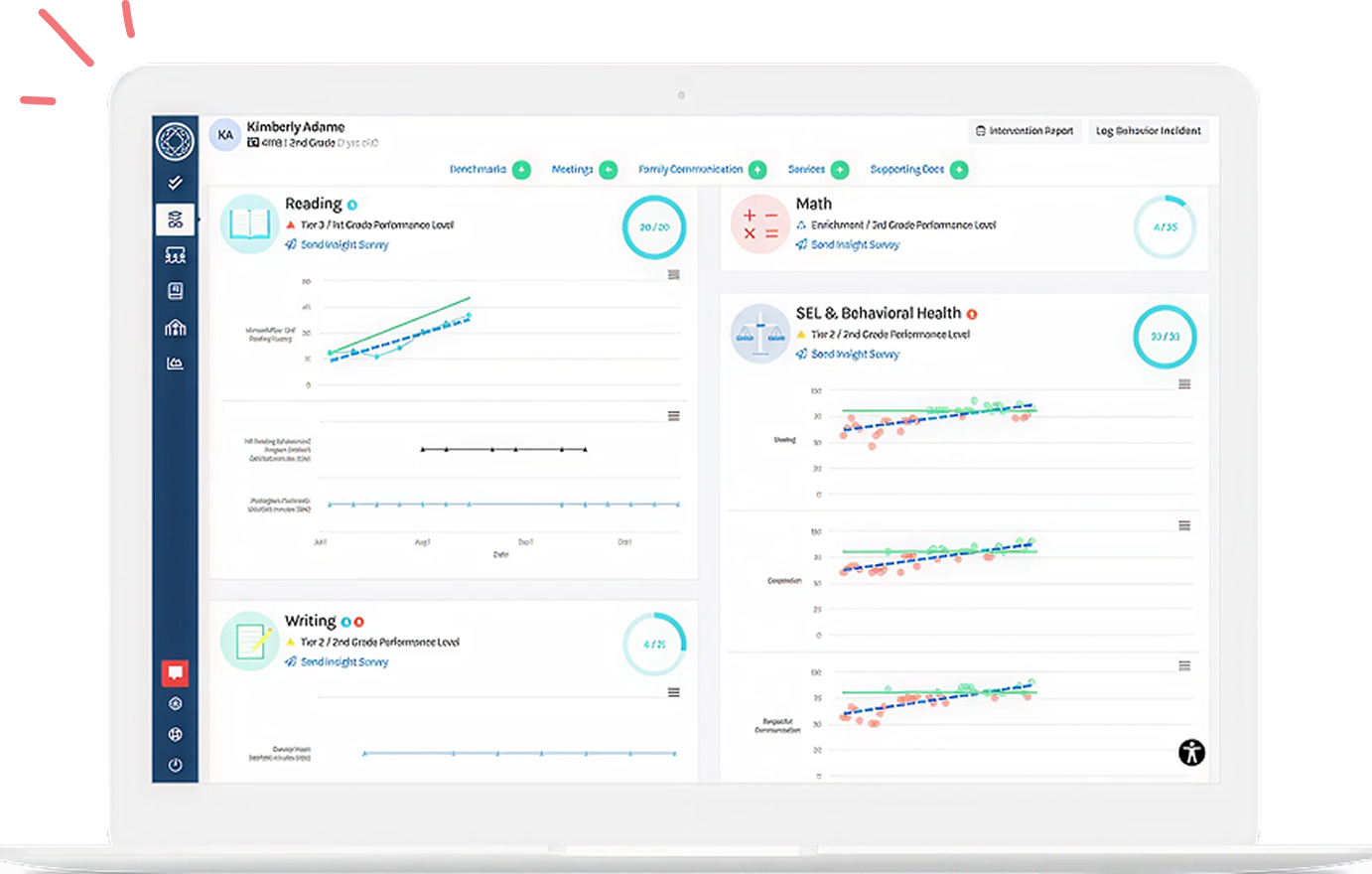Note: This blog was originally published in March 2021 and has since been updated.
Why Is Capacity Building So Critical for MTSS?
School leaders, I’d like to circle back with you to think about how you are developing your staff across your school and/or district. A couple of years ago, in this blog on building capacity, I shared the “who, how, and why we don’t” of leaders intentionally building capacity for leadership, sharing their talents and experience more broadly…in essence bringing all you can so that all of your staff and students benefit from every ounce of “know-how” possible!
And now, at the thought of this approaching school year, I am full of questions and reflection. Like you, this is a continuous part of my job, teaching and building up the people around me, both experienced and novice.
Who might be future leaders and ready for more responsibility?
- Who really stepped up as a committee, grade level, or project lead? Who demonstrated growth in their MTSS practice by creating objective plans, advocating more for students, and effectively communicating and collaborating with other agencies? What grade level or department committed in a big way to this work and improving the system?
What goals went unmet?
- Did we hit our academic goals?
- Did we accomplish our communication goals with parents and students?
- Did we provide support at the rate we intended?
- Was our support equitable?
What did you (as a leader) find yourself bogged down by?
- Did you meet with student support teams as often as you committed (and what got in the way?)
- Did you communicate with all the stakeholders you intended to?
- Were you successful in supporting individual and team-level staff as needed?
Who has provided leadership in a particular role for multiple years? It’s time to rotate that leadership! Rotation of leadership is vital for reducing resentment, jealousy, and limiting the number of educators who grow into stronger, more committed team members. Additionally, rotating leadership, especially in those roles that do not come with compensation, refreshes ideas that might promote another burst of improvement.
I hope this reflection will help you make the adjustments you need to refine the capacity building (growing your team members' “educator chops”), which will grow the culture of continuous improvement every school and district needs to succeed.
Leaders, Going Solo Slows You Down!
It’s fun to be a leader. You were chosen because you are a “solutions and get it done” kind of educator! It’s also very challenging, as it requires you to keep yourself fit — physically, mentally, and emotionally! It requires that we relinquish the superhero cape and share the real work of leadership.
The work district and school level leaders must accomplish is weighty, and we must admit that building positive capacity in others is the only way to accomplish our goals and sustain them over time. You could have the greatest initiative ever, and spend an entire year working for all hours every day to get it going, only to be moved to another campus or another position for the following year. What happens to your initiative, then? It slowly disappears as staff and leadership change. Moreover, doing everything on your own just takes longer! To solidify the foundation of a great initiative in an organization, it is crucial to build capacity in others.
Beyond preserving the initiative, educators grow their instructional skills when they are included in the “science of improvement,” which is a big part of MTSS. Their observation and diagnostic skills are sharpened as they evaluate the impact of applying focused strategies to specific student needs. The experience gained from analyzing MTSS data with colleagues translates back to the classroom, where those educators can then recognize skill and knowledge gaps more quickly and apply support within core instruction — in real-time. The more we study through the MTSS process, the smarter we become!
Who Are the Key Influencers for Capacity Building Work?
An important first step is to identify the key influencers in your staff. It may seem like you would want to surround yourself with the first folks who volunteer, those early adopters, but you may actually want to avoid surrounding yourself with only the ‘agreeables.’ Many good ideas are missed because we are reluctant to be uncomfortable raising them, and sometimes strengths are hidden under various forms of status and hierarchy.
Finding the right key influencers can be tricky, so here are a few things to consider. Select educators/staff members who are:
- Eager to learn and willing to share.
- Already seeking ways to support specific students/challenges.
- Respected across the community and could generate a network of adopters.
- The most outspoken critic — this may seem counterintuitive, but you need to hear them along the way. While challenging and perhaps conflict-producing, it is better to be open-minded up front and get a better outcome.
How To Plan for Capacity Building Work
Achieving an effective MTSS is a lofty and important goal, but a goal without a plan is just a dream. When planning for capacity-building work, it's important to engage your key players in outlining the initiative with goals, action steps, the responsible parties, tools, and timelines. Together with your team, determine the three or so most critical aspects of MTSS that you want everyone to be proficient with by the end of the semester or year. (X, Y, Z) Scaffold your plan. Your first draft of ideas may be as simple as this:
- The building MTSS team can do X, Y, and Z before the teacher rollout next month.
- One teacher per grade level or content area will work with a member of the building MTSS team to become proficient with X, Y, and Z prior to the first MTSS grade/content level meeting.
- That teacher then works with their team to ensure they are proficient with X, Y, and Z before the second MTSS content/grade level meeting.
- This will all happen by the end of the semester/year.
Let these ideas develop into an action plan, perhaps the district or school improvement plan. Each idea or goal should have metrics for success, actions to take to accomplish it, and someone who is responsible for monitoring and reporting progress. This is where your team can grow in their capacity. Many members may not have worked with such a plan before, but will recognize that it looks very similar to a student/group intervention plan -- I actually love how this MTSS Implementation Plan mirrors that for the staff.
💡 Additional Resource: Developing a Successful MTSS/RTI Team
A Few More Tips:
- Let the team share the plan with the whole staff — most people like to be a part of the solution and in the loop.
- Be crystal clear with expectations and how the work will move forward — transparency is critical, including discussing both growth and setbacks.
- Ask staff to commit to growing and doing things they may not have done before. Assure them they will be supported and how that will occur.
- Let them know how they can communicate their opinions and need for support.
- Model everything you want others to do.
- Let everyone know through your words and actions what is important to you, the team, and the campus.
- Keep the plan at the forefront of your interactions with your team.
- Knowing where your team is in the process can make or break any plan — so check in with the team often.
A final thought to consider during your implementation process is to be in it for the long game. Let your plan live its life. There will be hiccups, and folks might even complain! Listen and ask questions, but don’t quit because there are steps forward and backward. Problem-solve, adjust, and move forward with an even better plan. Seems pretty simple, right? And yet...
But, What Prevents Us From Building Capacity?
Educators often talk about promoting a “growth mindset” with our students, but get stuck in a “fixed mindset” when it comes to thinking about our teachers and our teams’ needs. We forget that teachers really want all of their students to be successful, and they want to be successful, themselves! We often approach our staff as if they have already mastered it all (or should have), rather than approaching them as learners, in need of support from us, their leaders.
We can also shy away from staff members that are reluctant or resistant. They usually resist because they are learners, with fears of failure, and both physical and initiative fatigue. Those struggling educators are precisely the ones that need our support to coach them through their overwhelming feelings. Leaders must remind them of (or show them) management tools like Branching Minds; and talk them through their planning process, asking probing questions and helping them look for efficiency — perhaps they've forgotten to prioritize what is important. We must help them free their brains by lessening their fear and finding simpler solutions. As learners, teachers will get as excited about their "lightbulb moments" as they do when their students have them.
We also can’t forget the tug of our own egos. As the LEADER, we have become the "solution" person and sometimes think we have the best ideas or easiest solutions… and it's all feeding our own needs. That's okay, because we are learners, too. We are learning how to lead and share responsibility through building capacity in our team. We are learning how to recalibrate when our primary goal of being a learning organization is usurped by my need to be in charge, to be the best (fill in the blank) in everyone's minds. We are all human. We don't always have our best day, best hour, or best conversation. We can restart, take a deep breath and recommit to our purpose — to use all of the talent and energy available to build a culture of support around all of our students and staff.
|
|
Ready to build capacity for your educators and deliver positive outcomes for all students?Learn about the Branching Minds Professional Learning Series, which helps school and district leaders streamline and improve their MTSS practice at the systems level, helping them to achieve consistent high-fidelity practice, build capacity for educators, and deliver positive outcomes for all students.
|
|
![[Guest Author] Karen Castle-avatar](https://www.branchingminds.com/hs-fs/hubfs/Team/Karen-1.jpeg?width=82&height=82&name=Karen-1.jpeg)
About the author
[Guest Author] Karen Castle

Your MTSS Transformation Starts Here
Enhance your MTSS process. Book a Branching Minds demo today.












.png?width=1436&height=956&name=Why%20Is%20Capacity%20Building%20So%20Critical%20For%20MTSS%20(1).png)


.png?width=716&height=522&name=Tier%203%20Behavior%20Support%20Planning%20(preview).png)
